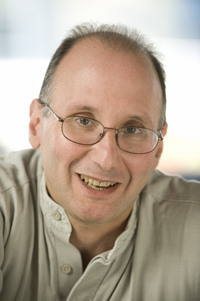15 avril 2011: Prof. Michael R.Stratton
Friday, April 15th 2011, 12h30
Prof. Michael R. Stratton FRSDirector of the Wellcome Trust Sanger Institute

"Evolution of the Cancer Genome "
All cancers carry somatically acquired changes in their genomes. Some, termed “driver” mutations, are causally implicated in cancer development. The remainder are “passengers”, and bear the imprints of mutational processes operative during cancer development. Following the advent of second generation sequencing technologies the provision of whole cancer genome sequences has become a reality. These sequences generate comprehensive catalogues of somatic mutations, including point mutations, rearrangements and copy number changes and provide insights into the evolutionary processes underlying the development of individual human cancers including the factors generating variation and the forces of selection. These insights will form the foundation of our understanding of cancer causation, prevention and treatment in the future.
Biography
Michael Stratton is Director of the Wellcome Trust Sanger Institute. He qualified in medicine at Oxford University and Guy’s Hospital, obtained a PhD in the molecular biology of cancer at the Institute of Cancer Research, London and trained as a histopathologist.
His primary research interests have been in the genetics of cancer. He mapped to chromosome 13 and identified the high risk breast cancer susceptibility gene BRCA2, has subsequently identified moderate risk breast cancer susceptibility genes including CHEK2, ATM, BRIP1 and PALB2 and characterised the histopathological features of breast cancers in individuals carrying susceptibility alleles. He identified the gene for hereditary cylindromatosis, a highly disfiguring predisposition to adnexal skin tumours, as well as susceptibility genes for testis, colorectal, thyroid, and childhood cancers.
In 2000 he initiated the Cancer Genome Project at the Wellcome Trust Sanger Institute which conducts high throughput, systematic genome-wide searches for somatic mutations in human cancer. The primary aims of this work are to identify new cancer genes, to understand processes of mutagenesis and to reveal the role of genome structure in determining abnormalities of cancer genomes. Through these studies he discovered mutations in the BRAF gene in malignant melanoma, mutations of the ERBB2 gene in lung cancer, and mutations of histone methylases and demethylases in renal and other cancers. He has described the basic patterns of somatic mutation in cancer genomes and used next generation sequencing to generate catalogues of somatic mutations in cancer genomes.
